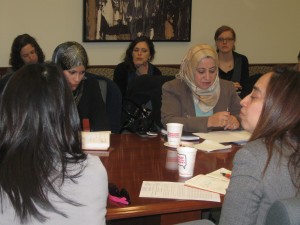Seminar on Integrating Gender Perspectives into the Third Pillar of the Responsibility to Protect
On February 21, a group of 35 scholars and activists gathered at the UN for a GAPW-sponsored event on Integrating Gender Perspectives into the Third Pillar of the Responsibility to Protect (RtoP).
The event featured Naomi Kikoler, Director of Policy and Advocacy for the Global Center on the Responsibility to Protect and Maria Butler, Director of the PeaceWomen Project of the Women's International League for Peace and Freedom.
We were also joined by two extraordinary Libyan women who spoke eloquently about the time of suffering in their country and offered insights into evolving roles of women in Libya and why the UN authorized response in their country was needed. 
From WILPF perspective, Maria shared WILPF's recent comments on R2P: “Protection, real protection, can only be realized through prevention. This is the essence of responsibility to protect and the essence of all the Security Council Resolutions on women, peace, and security.
The doctrine is there to prevent: it has failed and will continue to be demeaned, if it is used as a means to legitimize armed intervention.”
As the WILPF statement underlines the multilateral systems that are supposed to ensure that international law is upheld, that human rights are protected and that there is accountability for violations, failed the people of Libya and failed well before the SCR 1973. WILPF's comments at this meeting focused on the need to make sure that we are looking at prevention in a holistic and integrated manner.
Effective prevention of mass atrocities will need to take on this integrated and early approach, which must include a gender perspective.
For access to the draft Concept Note on gender and R2P, click here.
